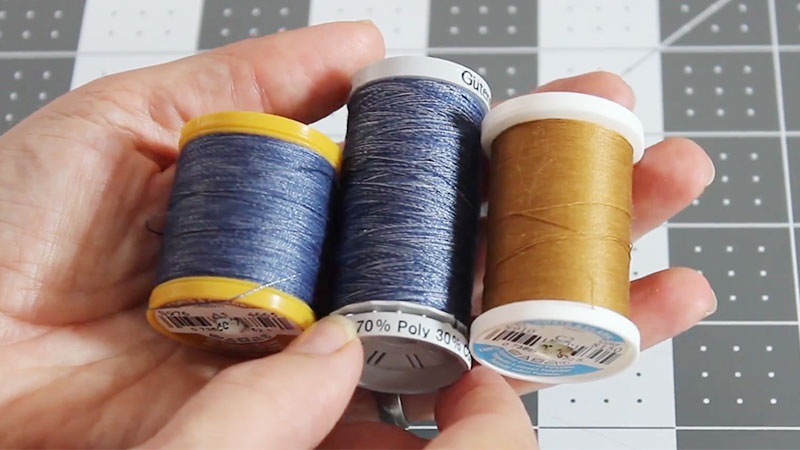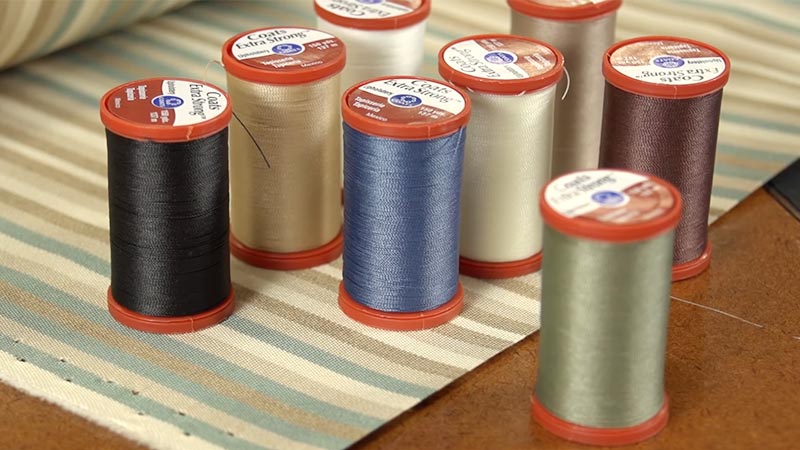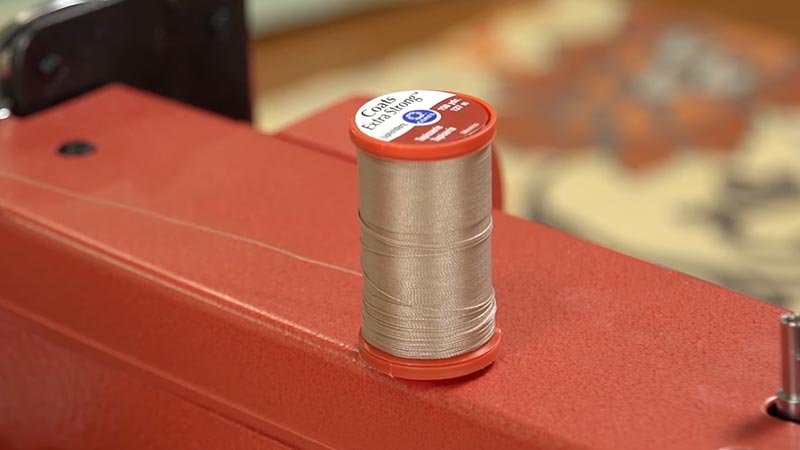Selecting the right thread for sewing Olefin fabric is a critical decision that can significantly impact the quality and longevity of your projects.
Olefin, renowned for its strength and resistance to moisture, finds extensive use in outdoor applications and high-traffic settings.
To complement these exceptional characteristics, choosing the appropriate thread is essential. Polyester thread emerges as the ideal choice for sewing Olefin.
Its attributes, including strength, UV resistance, low lint count, stain resistance support, and abrasion resistance, align seamlessly with Olefin’s properties, ensuring durable and visually appealing seams.
In this discussion, we will delve into the compelling reasons why polyester thread stands out as the preferred option for sewing Olefin, enhancing the overall success of your projects.

What Thread To Use When Sewing Olefin?
When it comes to sewing Olefin, choosing the right thread is crucial for ensuring your project’s longevity, strength, and overall quality.
Olefin is a synthetic fiber known for its durability, moisture resistance, and overall strength, making it a popular choice for outdoor and high-traffic applications.
A polyester thread is ideal for sewing Olefin fabric to complement these properties and achieve the best results.
Here are some key reasons why the polyester thread is the preferred option for sewing Olefin:
Strength and Durability
Olefin fabric is prized for its ability to withstand wear and tear. Polyester thread is equally robust, creating seams that match Olefin’s durability. This ensures that your projects maintain their integrity, even in demanding conditions.
UV Resistance
Olefin is often used indoors, where it’s exposed to sunlight. Prolonged sun exposure can cause fabrics to fade and weaken.
Polyester thread is highly UV-resistant, providing essential protection to Olefin against the harmful effects of UV rays.
This UV resistance helps to maintain the fabric’s color and strength over time.
Low Lint Count
Polyester thread has a low lint count, which sheds fewer loose fibers during sewing. This characteristic is vital for achieving clean and clear stitches, enhancing the overall appearance of your project, and minimizing the need for constant cleaning.
Stain Resistance Support
Olefin is naturally resistant to staining, making it an excellent choice for applications prone to spills and dirt. Polyester thread complements this stain resistance by ensuring that the fabric retains its ability to repel stains effectively.
Abrasion Resistance
Polyester thread is known for its abrasion resistance. This property is valuable when sewing Olefin fabric used in high-traffic areas or environments where friction and wear are expected. The thread’s ability to withstand abrasion further contributes to the durability of the seams.
Versatility
Polyester thread is highly versatile and suitable for various sewing projects, including those involving Olefin fabric. Its compatibility with different sewing machines and applications makes it a convenient and reliable choice for amateur and professional sewers.
How Does UV Resistance in Polyester Thread Benefit Olefin Projects?

The UV resistance in polyester thread offers several significant benefits for Olefin projects, especially when they are exposed to sunlight and outdoor conditions:
Prevents Color Fading
UV rays from the sun can cause fabric colors to fade over time. Olefin, like many synthetic materials, may be vulnerable to UV damage. By using UV-resistant polyester thread, you help protect the fabric’s color integrity.
This is particularly crucial for outdoor applications like patio furniture, umbrellas, or awnings, where vibrant and fade-resistant colors are desired.
Extends Fabric Lifespan
UV resistance in the thread can significantly extend the lifespan of Olefin projects. Olefin fabric can break down and deteriorate when exposed to harsh sunlight for extended periods.
The UV-resistant thread acts as a shield, reducing the fabric’s exposure to harmful UV radiation and helping it last longer.
Maintains Structural Integrity
UV-resistant polyester thread helps maintain the structural integrity of Olefin fabric. It reduces the risk of fabric weakening, becoming brittle, or developing holes due to UV damage.
This is especially important for applications where fabric strength and longevity are essential, such as outdoor cushions or boat covers.
Enhances Durability
UV resistance not only protects against color fading but also contributes to the overall durability of Olefin projects. With a longer lifespan and reduced UV damage, the projects remain in better condition, requiring fewer repairs or replacements.
Reduces Maintenance
Olefin projects exposed to the sun often require less maintenance when using UV-resistant thread. Since the fabric and thread are less prone to UV damage, you won’t need to replace or repair them as frequently, saving time and money on upkeep.
Preserves Aesthetics
UV-resistant thread helps maintain the visual appeal of Olefin projects. The fabric’s original appearance, color, and overall aesthetics are better preserved, ensuring your outdoor furniture or decor looks appealing for extended periods.
Cost-Effective
While UV-resistant thread may be slightly more expensive than standard thread, the long-term cost-effectiveness is evident. You save money by not having to replace Olefin projects as often, making it a wise investment, particularly for outdoor items exposed to sunlight.
Key Considerations When Selecting Thread for Olefin Sewing Projects

When selecting thread for Olefin sewing projects, there are several key considerations to keep in mind to ensure your work’s best results and longevity.
These considerations include:
Thread Material
The primary thread material recommended for sewing Olefin is high-quality polyester. Polyester thread offers excellent strength, UV resistance, and durability, making it the top choice for Olefin projects.
Strength
Olefin fabric is known for its strength, so the thread you choose should match or exceed this strength. Polyester thread is strong and can withstand the stress and strain that Olefin may encounter.
UV Resistance
Olefin is often used in outdoor applications and exposed to sunlight. Select a thread with UV resistance to protect the fabric from the harmful effects of prolonged sun exposure.
Thread Weight or Thickness
The thread weight or thickness should be appropriate for the specific project. Consider using a thicker or heavier thread for projects that will endure heavy use or for items that require added durability.
Low Lint
Polyester thread has a low lint count, which sheds fewer loose fibers during sewing. Choosing a thread with low lint helps maintain clean and clear stitches, improving the project’s overall appearance.
Stain Resistance
Olefin is naturally resistant to staining, and using polyester thread complements this feature by helping the fabric maintain its stain resistance. This is especially important for items that may come into contact with various substances.
Abrasion Resistance
Polyester thread is known for its high abrasion resistance. This is valuable for sewing projects that experience friction and wear, such as items in high-traffic areas or those subjected to frequent use.
Color Matching
Select thread colors that match or complement the color of the Olefin fabric. This ensures the stitches blend well and not detract from the project’s aesthetics.
Application
Consider the specific application of your Olefin project. Whether it’s outdoor furniture, bags, or other items, the thread you choose should align with the project’s intended use and the environmental conditions it will face.
Machine Compatibility
Ensure that the thread you choose is compatible with your sewing machine. Polyester thread is generally suitable for a wide range of sewing machines, but it’s essential to check the manufacturer’s recommendations.
Project Requirements
Assess the specific requirements of your sewing project. For example, if you’re sewing heavy-duty outdoor cushions, you may need a different thread than making lightweight Olefin curtains. Tailor your thread choice to your project’s unique needs.
Personal Preferences
Some sewers may have personal preferences for thread brands or qualities. Selecting a high-quality thread that you feel comfortable working with and that aligns with your preferences is essential.
FAQs
What thread is best for sewing Olefin fabric?
The best thread for sewing Olefin is the polyester thread. Its strength, UV resistance, and durability make it ideal for outdoor and high-traffic applications.
Is polyester thread suitable for all Olefin sewing projects?
Polyester thread is versatile and suitable for a wide range of Olefin sewing projects, making it a convenient choice for various applications.
How do you select the correct thread weight for Olefin fabric?
The thread weight should be chosen based on the specific project’s requirements. Thicker or heavier threads suit high-stress applications, while lighter threads work for lightweight projects.
Can I use cotton thread to sew Olefin fabric?
Cotton thread is not recommended for sewing Olefin due to its lack of UV resistance and lower durability than polyester thread.
Can I use polyester thread for the top and bobbin when sewing Olefin?
Yes, using polyester thread in both the top and bobbin threads is a common and effective practice when sewing Olefin fabric, ensuring uniform stitching quality.
To Recap
The choice of thread when sewing Olefin fabric is paramount for the success of your projects. Polyester thread emerges as the prime candidate due to its remarkable attributes.
Its strength and durability match Olefin’s robustness, while its UV resistance shields against color fading, making it ideal for outdoor and high-traffic applications.
The low lint count enhances the clarity and cleanliness of your stitches, and its stain resistance support complements Olefin’s inherent qualities.
Moreover, the abrasion resistance of polyester thread ensures long-lasting seams. Whether you’re crafting outdoor cushions, awnings, or other Olefin-based items, polyester thread ensures that your projects endure and maintain their aesthetic appeal.
It’s the thread that aligns seamlessly with Olefin’s potential, securing the quality and longevity of your creations.
Leave a Reply